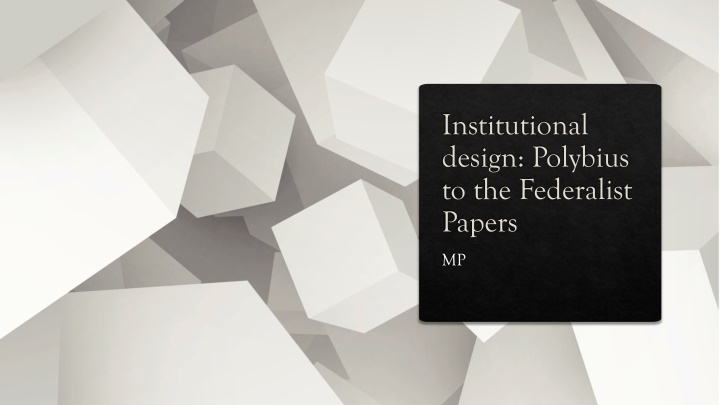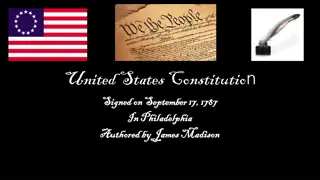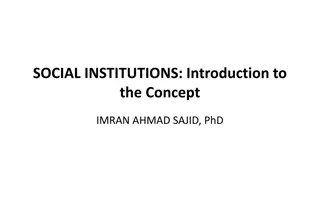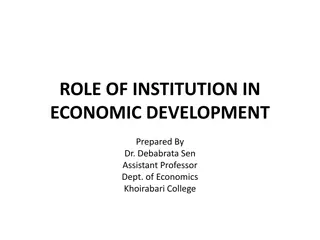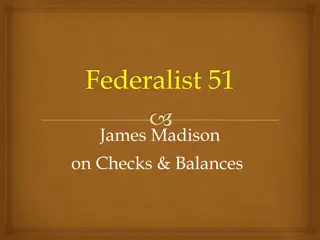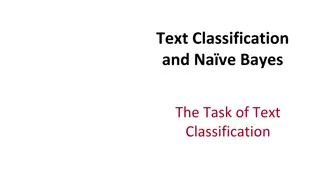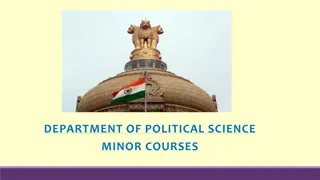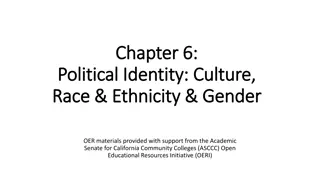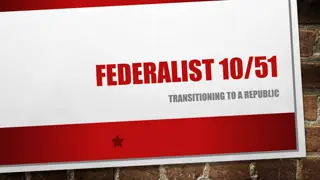Evolution of Political Institutions from Polybius to the Federalist Papers
Explore the evolution of political institutions from ancient thinkers like Aristotle and Polybius to the insights reflected in the Federalist Papers. Delve into the classification of government types, the analysis of political constitutions, and the cyclical nature of states and revolutions as discussed by these influential figures in political philosophy.
Download Presentation

Please find below an Image/Link to download the presentation.
The content on the website is provided AS IS for your information and personal use only. It may not be sold, licensed, or shared on other websites without obtaining consent from the author.If you encounter any issues during the download, it is possible that the publisher has removed the file from their server.
You are allowed to download the files provided on this website for personal or commercial use, subject to the condition that they are used lawfully. All files are the property of their respective owners.
The content on the website is provided AS IS for your information and personal use only. It may not be sold, licensed, or shared on other websites without obtaining consent from the author.
E N D
Presentation Transcript
Institutional design: Polybius to the Federalist Papers MP
Aristotle 384-322 BCE 6 fold classification of government Monarchy Tyranny Aristocracy Oligarchy Polity Democracy every city-state is a sort of community and every community is established for the sake of some good (for everyone does everything for the sake of what they believe to be good), it is clear that every community aims at some good, and the community which has the most authority of all and includes all the others aims highest, that is, at the good with the most authority. This is what is called the city- state or political community. [I.1.1252a1 7]
Polybius 200-120 BCE The Rise of the Roman Empire Greek forced to move to Rome after Greek defeat at Macedon in 167 BCE where he became friends with the son of the Roman general who had led the Roman forces at Macedon, Scipio Amelianus. Allowed to return to Greece in 150, but remained close, and accompanied him in the 3rd Punic War against Carthage.
Book 6 sect. 2-11 Analysis of political constitutions Generally distinguished into 3 types: Monarchy, Aristocracy and Democracy Resists the typology as overly normative involving arguments about the best states Kinship only where rule by one man and where he is voluntarily accepted by his subjects, and which are governed by an appeal to reason rather than fear or force. Aristocracy the justest and wisest men who have been selected on their merits Democracy not where the people are free to do what they want but where it is customary to reverence the gods, to care for our parents, to respect our elders, to obey the laws, and to ensure that the will of the majority prevails.
The cycle of states and revolutions (Polybius) Polity/Democracy Kingship/Tyranny Aristocracy/ Oligarchy Or Democracy/Mob rule Rule by single individual Rule by the few Rule by the many Rule in the interests of Rule in the interests of Rule justly vs license and lawlessness the state vs the ruler the state vs the rulers Corruption and overthrow Corruption and overthrow Corruption and overthrow after which they must once more find a master and a despot
Lycurgus Spartan Law-giver 820 BCE he (Lycurgus) took the view that every type of constitution which is simple and founded on a single principle is unstable, because it quickly degenerates into that form of corruption which is peculiar to and inherent in it. For just as rust eats iron, and wood worms or ship worms eat away timber, and these substances are destroyed by the processes which are generated within themselves, so each constitution possesses its own inherent and inseparable vice. Polybius, VI.10
VI (10) contd In kingship the inbred vice is despotism, in aristocracy it is oligarchy, and in democracy it is the brutal rule of violence and it is impossible to prevent these forms of government from degenerating into the debased form of itself. Seeing this Lycurgus did not make his constitution simple or uniform, but combined in it the virtues and distinctive features of the best governments, so that no one principle should become preponderant, and thus be perverted into its kindred vice, but that the power of each element should be counterbalanced by the others ..the constitution should remain for a long time in a state of equilibrium thanks to the principle of reciprocity or counteraction (but nothing human is immortal!)
The Legislator Plato s Guardians (Republic), Statesman (Statesman/Politicus), Nocturnal Council (Laws) Aristotle s Politics Recurrent motif a function of the perceived short-fall of rationality and self-interest, and the need for good institutions to ensure good citizens. And the tension between will and law: He who bids the law rule bids God and reason alone rule; he who bids man rule adds an element of the beast .The law is reason unaffected by desire. (Aristotle s Politics) Machiavelli s Prince Rousseau s Social Contract Historical examples: Solon, Lycurgus, Philip and Alexander of Macedon,
Machiavelli Discourses (c. 1517) bk 1.2 All the forms of government mentioned above (the 6) are far from satisfactory, the three good ones because their life if so short, the three bad ones because of their inherent malignity. Hence prudent legislators , aware of their defects, refrained from adopting as such any one of these forms, and chose instead one that shared in them all, since they thought such a government would be stronger and more stable, for if in one and the same state there was a principality, aristocracy and democracy, each would keep a watch over the other. Then argues that the Roman republic started with Kingship but gradually evolved, more by accident than design, to combine elements of kingship (Consuls), aristocracy (Senate), and people and their Tribunes. Prince and Discourses
Montesquieu LEsprit des Lois 1748 Classification of Government 3 fold: Monarchy, Republic, Despotism 4 fold: Monarchy/Republic =Aristocracy or democracy/Despotism 6 fold: Monarchy- despotism Aristocracy despotism Democracy - despotism
Montesquieu Bk 11, ch 6 Distinction between three sorts of power: Legislative power; executive power re: Law of nations (war, embassies, peace etc.; executive power or power of judging over civil right (punishment of crimes or judging disputes). Legislative power must be separate from executive power and power of judging must be separate from both. Model is England if somewhat roseate
2 doctrines Mixed government and the balance of powers Separation of powers and division of office Countervailing powers Separate powers and jurisdiction Compatible with class conflict Legalistic and institutional rather than social in character Dynamic tensions Demarcation of spheres
Which is Montesquieus account Combination of different elements Working with both a class-based sense of the separate character of legislature and executive Clearly regards different interests in the community as central to the form of government Partly drawn to law but interprets it in a very wide way necessary relation between things
Federalist Papers Oct 1787-May 1788 Alexander Hamilton, James Madison, John Jay a.k.a. Publius
Constitutional Congress Philadelphia Convention May 1787 States Rights Internal trade and order External defense Negotiation with other powers Character of the central government Protection of the rights of citizens
Why USA cant work! Extensive territory Montesquieu is clear that a republic can only survive in small city states which is treated as an argument for state s rights (but with difficulty given their geographical extent) Where is the virtue? Commitment to the common good (and clear challenges to this in the war, and subsequently) Must it inevitably become a monarchy : On these shores freedom has planted her standard, diped in the purple tide that flowed from the veins of her martyred heroes; and here every uncorrupted American yet hopes to see it supported by the vigour, the justice, the wisdom and unanimity of the people, in spite of the deep-laid plots, the secret intrigues, or the bold effrontery of those interested and avaricious adventurers for place, who intoxicated with the ideas of distinction and preferment have prostrated every worthy principle beneath the shrine of ambition. Yet these are the men who tell us republicanism is dwindled into theory that we are incapable of enjoying our liberties and that we must have a master.. Mercy Otis Warren Fundamental divisions over slavery, taxation, fear of big government Bill of rights
Federalist Papers and the Struggle for ratification Struggle to ensure participation in the Convention - Then struggle to secure 2/3rds ratification by the 13 states First Delaware Dec 7 1787, then Pennsylvania, New Jersey and Georgia, Connecticut Then it gets stickier narrowly squeaks past in Massachusetts, Then Maryland, South Carolina, and New Hampshire (by 57-46) That vote meant it was accepted then followed by New York (30-27) and Virginia North Carolina first rejected it then re-voted in Nov 1789 and accepted it. Rhode Island was the last to accept (by 34 to 32)
85 original essays by Publius, published in a variety of newspapers, then drawn together as the Federalist Papers Deeply informed by contemporary debates which were in turn deeply informed by classical literature and enlightenment thinking. Claims an improved science of politics from the times of Greece and Rome Esp: doctrines of separation of powers; legislative balances and checks, judicial independence, the system of representation (the republican principle). FP 9 Confederate Republic Montesquieu s doctrine
Problem is trying to unite the small republic principle for internal government with the need for a combined external force that monarchical government gives. A confederate government is a convention whereby several smaller states agree to become members of a larger one extensive quotation from Spirit of Laws, IX (i) FP 9 Jay Elements of balance of powers no one state would be granted ascendancy, collectively it can quell internal disorders Montesquieu: ..were I to give a model of an excellent confederate republic, it would be that of Lycia. viz a thriving maritime people confederated in at least a score of cities that made up the Lycian League
FP 10 Madison Dangers of faction in a republic: our governments are too unstable; the public good is disregarded in the conflict of rival parties and measures are often decided by the superior force of an interested and overbearing majority. Faction a number of citizens united and actuated by some common impulse of passion, or of interest, adverse to the rights of other citizens, or to the permanent and aggregate interests of the community. Two ways of controlling it removing its causes; controlling its effects For the first we must either destroy people s liberty, or give every citizen the same opinions, passions and interests. Liberty is to faction what air is to fire. Can t create unity where men are fallible, of diverse faculties, different degrees of property; inevitable that parties of interest form, and parties in relation to religion. Cannot assume wise statemen.
Controlling the effects of faction Where faction is a minority then the republican principle of majority rule will correct it Where it is a majority how do you protect public good and private rights? Democracy vs republic in the latter you have representation Election by the greater number of citizens refines and enlarges public views Body elected will be animated by concern for their country and less likely to sacrifice it to partial considerations Large republics better placed than small to control the effects of faction and confederated republics still more so. Changing proportion of rep to constituent the larger the state- the more difficult to secure a majority Extending territory you get wider range of interests and reduce common motives inimical to the whole
Why are they important Similarities and Contrast with Rousseau Natural society Fears of corruption Republic of virtue Republic of interest Reworking of Montesquieu -
Institutional design Emphasis in Montesquieu and Rousseau on the suitability of institutions for the distinctive character of the people. Is that present? Extremely detailed defence of institutional structure of Federal government and its relation to the State governments and to the states. Turning theory into practice. Devil is in the detail. Highly political document. As we saw from Paine s statement last week there is a sense of America as different. BUT
Institutional design 2 That it is possible to create a self-equilibriating system (not unlike mixed government BUT not based on social classes moved from that to a story of interests and parties) Can see in the arguments about design the idea: In contrast very much about separation of powers. Paradox of design for the imperfectly virtuous. Flexible enough to cope with new experiences and elements, but capable of standing the test of time (BUT Hamilton s expectations) Crucial to recognize how much it is concerned with Federal matters setting up State s rights issues. Constitutional design as a new thing - Linda Colley, The Gun, the Ship and the Pen (2021)
Founding Fathers and History Constitutional interpretation as a very live element Founding Covenant Manifest destiny American exceptionalism
Oops and another thing or two, or more Bill of rights and their place Judicial review Direct election of Senate Direct election of the President Limiting terms of office for Presidents Slavery and apportionment (Art 1, s. 3) But compare with France s 5 republics
